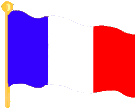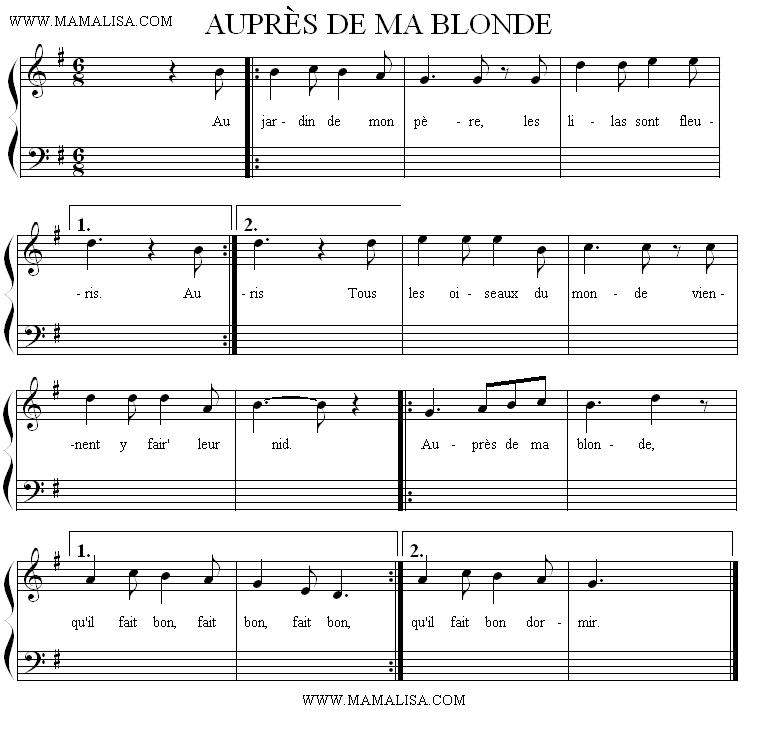Auprès de ma blonde
Auprès de ma blonde
By My Fair One's Side
Chanson traditionnelle
Traditional Song
(French)
(English)
Au jardin de mon père les lilas sont fleuris,
Au jardin de mon père les lilas sont fleuris,
Tous les oiseaux du monde viennent y faire leur nid.
Refrain
Auprès de ma blonde, qu'il fait bon, fait bon, fait bon,
Auprès de ma blonde, qu'il fait bon dormir.
Tous les oiseaux du monde viennent y faire leur nid,
Tous les oiseaux du monde viennent y faire leur nid,
La caille, la tourterelle, et la jolie perdrix.
(Refrain)
La caille, la tourterelle, et la jolie perdrix,
La caille, la tourterelle, et la jolie perdrix,
Et la blanche colombe qui chante jour et nuit.
(Refrain)
Et la blanche colombe qui chante jour et nuit,
Et la blanche colombe qui chante jour et nuit,
Qui chante pour les filles qui n'ont pas de mari.
(Refrain)
Qui chante pour les filles qui n'ont pas de mari,
Qui chante pour les filles qui n'ont pas de mari,
Pour moi, ne chante guère car j'en ai un joli.
(Refrain)
Pour moi, ne chante guère car j'en ai un joli,
Pour moi, ne chante guère car j'en ai un joli,
Dites-nous donc, la belle, où donc est votre mari ?
(Refrain)
Dites-nous donc, la belle, où donc est votre mari ?
Dites-nous donc, la belle, où donc est votre mari ?
Il est dans la Hollande, les Hollandais l'ont pris.
(Refrain)
Il est dans la Hollande, les Hollandais l'ont pris,
Il est dans la Hollande, les Hollandais l'ont pris,
Que donneriez-vous, la belle, pour avoir votre mari ?
(Refrain)
Que donneriez-vous, la belle, pour avoir votre mari ?
Que donneriez-vous, la belle, pour avoir votre mari ?
Je donnerais Versailles, Paris et St. Denis.
(Refrain)
Je donnerais Versailles, Paris et St. Denis,
Je donnerais Versailles, Paris et St. Denis,
Les tours de Notre Dame, le clocher de mon pays.
(Refrain)
Les tours de Notre Dame, le clocher de mon pays,
Les tours de Notre Dame, le clocher de mon pays,
Et ma blanche colombe qui chante jour et nuit.
(Refrain)
In my father's garden, the lilacs have bloomed,
In my father's garden, the lilacs have bloomed,
All the birds in the world come to build their nests there.
Chorus
By my fair one's side, how good, how good, how good,
By my fair one's side, how good it is to sleep.
All the birds in the world come to build their nests there,
All the birds in the world come to build their nests there,
The quail, the turtledove and the pretty partridge.
(Chorus)
The quail, the turtledove and the pretty partridge,
The quail, the turtledove and the pretty partridge,
And the white dove that sings day and night.
(Chorus)
And the white dove that sings day and night,
And the white dove that sings day and night,
That sings for the girls who have no husband.
(Chorus)
That sings for the girls who have no husband,
That sings for the girls who have no husband,
It does not sing for me because I have a nice one.
(Chorus)
It does not sing for me because I have a nice one,
It does not sing for me because I have a nice one,
Tell us, pretty one, where is your husband then?
(Chorus)
Tell us, pretty one, where is your husband then?
Tell us, pretty one, where is your husband then?
He is in Holland, the Dutch took him.
(Chorus)
He is in Holland, the Dutch took him,
He is in Holland, the Dutch took him,
What would you give, pretty one, to have your husband back?
(Chorus)
What would you give, pretty one, to have your husband back?
What would you give, pretty one, to have your husband back?
I would give Versailles, Paris and St. Denis.
(Chorus)
I would give Versailles, Paris and St. Denis,
I would give Versailles, Paris and St. Denis,
The towers of Notre-Dame, the steeple of my hometown.
(Chorus)
The towers of Notre-Dame, the steeple of my hometown,
The towers of Notre-Dame, the steeple of my hometown,
And my white dove that sings day and night.
(Chorus)
Notes
Versailles, Paris and St Denis are French towns, Notre-Dame (Our Lady) is a Cathedral in Paris.
There are slightly different versions of this song. It's also well-known in Canada.
The tune existed in the mid 17th century. The verses were composed later. The author of the lyrics is André Joubert. He was from the isle of Noirmoutier and was taken hostage by the Dutch in 1674. The song was first seen in print in 1704.

Thanks and Acknowledgements
Translation: Tatie Monique and Mama Lisa.
Merci beaucoup !


























